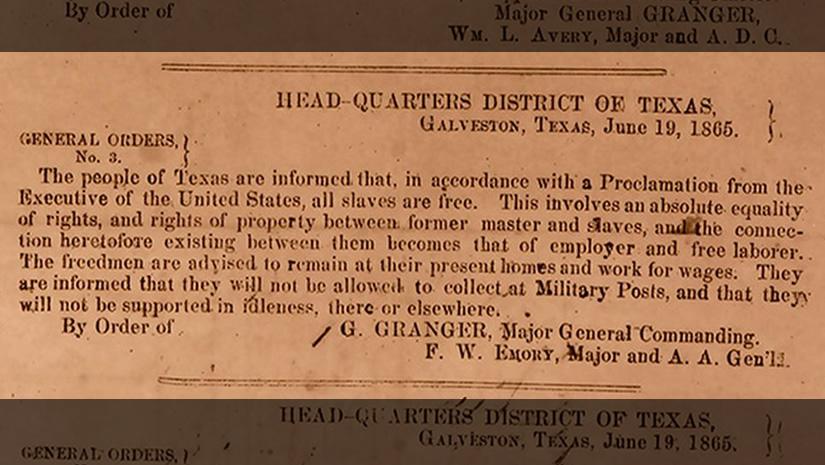A Reflection on Juneteenth

Image of Military Orders by General Graham Granger, 1821-1876, Wikimedia Commons / Public domain
The following is the text of the official recorded version of the order:
Head Quarters District of Texas
Galveston Texas June 19th 1865.General Orders No. 3.
The people of Texas are informed that, in accordance with a proclamation from the Executive of the United States, all slaves are free. This involves an absolute equality of personal rights and rights of property between former masters and slaves, and the connection heretofore existing between them becomes that between employer and hired labor.
The freedmen are advised to remain quietly at their present homes and work for wages. They are informed that they will not be allowed to collect at military posts and that they will not be supported in idleness either there or elsewhere.
By order of Major General Granger
F.W. Emery, Major A.A. Genl.
Sometime in May, I was scrolling through Twitter, and saw a notice about a Juneteenth celebration that was being offered in Little Rock, Arkansas. Since CWACM had held a Justice Summit in Little Rock, I looked more closely. The poster shown on the tweet advertised “three floors of food” alongside a large celebration. And then…. photos of the organizers of this Juneteenth celebration were displayed. Three. White. People.
In the past, I would have thought that was fantastic. How wonderful to fund a celebration. Not now. Not Juneteenth. Not more appropriation of a holiday that calls for deep reflection on my part as a white person. June 19, 1865 – two and a half years after the Emancipation Proclamation – enslaved people in Texas were informed that they were now “free.”
One of my first questions has remained, “why did it take so long?” Followed immediately by looking at the larger stain upon humanity that slavery ever existed, and that it continues to exist in different forms in the USA and around the world. Slavery profits those for whom the systems of power in the USA were designed. I am white, and remain one of the people responsible for the continued existence of those systems.
My work is to celebrate with Black people who mark Juneteenth as a community celebration. My work is also to continue to live more fully into my own humanity as I attempt to bring my own power alongside others working to change the ways we live in community. On our last Community Call, we were asked a question during our time of Centering, “what am I willing to accept in exchange for my freedom?”
What does freedom look like when no one is free until everyone is free? What does it take for change to happen?
To finish this particular story – there was such a strong and immediate pushback online, locally, and nationally concerning that particular Juneteenth celebration in Little Rock, that it was quickly cancelled.


